Annette Lu: The Thorn of a Thousand Tyrants
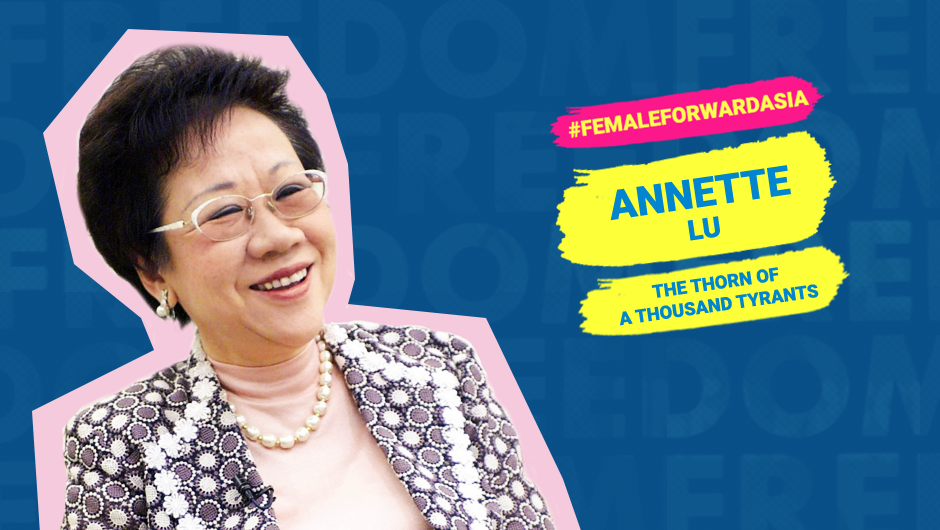
She is best known as the first woman vice president of Taiwan for two consecutive terms. An impressive political career but she is more than that. Her ascent to the second highest position of the land is attributable to courage, competence and character but it was also paid with a hefty price—personal sacrifices including her health, political persecution, imprisonment, constant threats of execution, and gender discrimination.
The feminist, journalist, lawyer, activist, politician, academic and author of several books both fiction and nonfiction has been hailed for her unassailable intellect. But again, she is more than that. She has heart, she has guts, and she delivers strong punches. A Renaissance woman with the warrior instincts of a Medieval ruler; a helpless damsel in distress is the last thing that she is, and a knight in shining armor is the last thing that she needs.
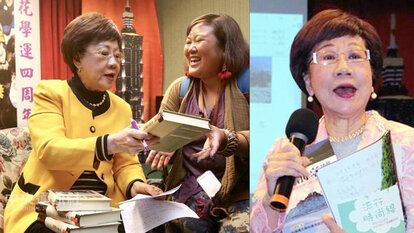
But the communist government of China, panicked by the prospect of the reformist Democratic Progressive Party (DPP) gaining control of government and promoting its pro-independence advocacy, and in particular, the prominent role that the fiercely outspoken Annette Lu was surely to play in the new dispensation, branded her as the “scum of the earth” and “sinner of a thousand years”.
She has had detractors and critics even from her own party who described her as “a big mouth” and “a loose cannon”. Her independent mindedness and her ardent and unwavering pro-in- dependence stance did not sit well within the party hierarchy by the new millennium, which in Taiwan was also the dawning of a new political era.
Realpolitik demanded a toning down of DPP’s independence rhetoric which was loud and clear when it was in the opposition but without compro- mising the country’s sovereignty and the party’s core values. DPP was not just a political party with like-minded members, it was now the government for all Taiwanese irrespective of partisan persuasion.
A 21 April 2000 Asiaweek article reported that President Chen Shui-bian, the first non-KMT member to hold the highest position of land, necessarily playing the role of peacemaker, was trying to be conciliatory with China as much as possible. While Lu did not have any personal problems with Chen, she was vocal with her differences in terms of cross-straits relations.
Things were becoming clear. As vice president, she did not see herself merely as a lady in waiting. And she was not just a female vice president, she was a feminist vice president. But this is getting ahead of the story. To fully appreciate this complex and multi-faceted person, it is important to start from the very beginning.
It is quite ironic that at the pinnacle of her political career, she earned a reputation as a loose cannon and an unguided missile. But quite the contrary, all her life she was always focused. And this was evident since she was a young girl. Her life is captured by the poem, Invictus, and indeed, she has been the captain of her soul and the master of her fate: this despite the many staggering obstacles that came her way.
Born Lu Hsiu-Lien in 1946 in the northern Taiwanese city of Taoyuan, she was an eye-witness to the most tumultuous events of her country’s history. She was born when Taiwan was still a colony of Japan and she was but a toddler when the nationalist gov- ernment of China led by Chiang Kai-Shek moved to Taipei after the communist take-over of China.
Her family was financial needy, and her parents twice tried to give her up for adoption but her elder brother prevailed upon his parents not to. She and her brother excelled in school. The unremarkable childhood of this remarkable woman underscores this essential point: that unlike many of the democratic icons profiled in this book, she did not belong to any family dynasty. Her political stars rose because of her own doing.
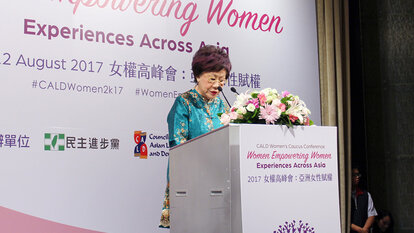
During a women’s conference of the Council of Asian Liberals & Democrats (CALD), Lu narrated that “I am the one who started to advocate feminism here in Taiwan 45 years ago. Traditionally Taiwan’s women suffered from the double burden of Chinese Confucianism and Japanese male chauvinism. Under such culture, women were taught nothing else but to serve and to please men, making women the second sex.”
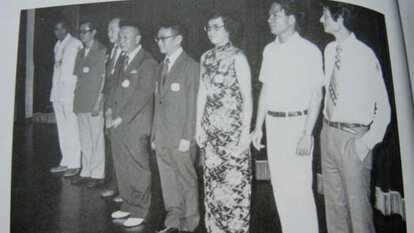
She lived through the entirety of martial rule from 1949 to 1987, the longest in world history. From a member of the monolithic Koumintang (KMT), she joined the Tangwai movement, the precursor of the Democratic Progressive Party (DPP), which called for an end to authoritarian rule and the institutionalization of democratic reforms.
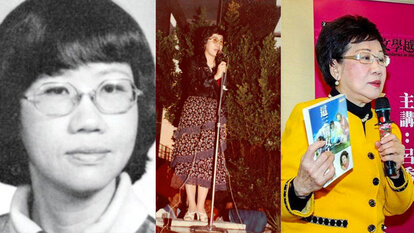
She joined the opposition at a time when there was no chance of gaining the majority given the KMT-installed system of appointed representatives aside from elected ones, in the guise of representing the non-voting districts of mainland China. This ensured the unchallenged power of the KMT regardless of electoral results. Members of both the Tangwai Movement and DPP were systematically oppressed, and some, even assassinated. Lu’s life was spared but she was not exempt from systematic political persecution.
Lu delivered a passionate twenty-minute speech criticizing the one-party government during Human Rights Day in 1979 in southern Taiwan’s biggest city. Virtually the entire leadership of the prodemocracy movement was arrested as result of what was to be known as the Kaoshiung Incident. Lu was tried, found guilty of sedition and sentenced to twelve years interment. One of her legal counsels was a young human rights lawyer who would later be her running mate in the historic 2000 elections. After being a prisoner of conscience for five and a half years, she was released because of international pressure especially from the United States.
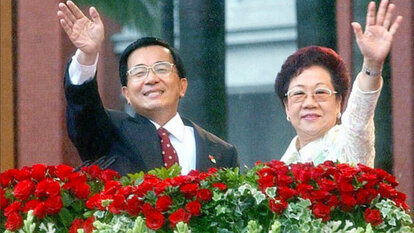
Lu is an accomplished lawyer who graduated with a law degree from Taiwan National University in 1967. She has Master’s in Law degrees from University of Illinois in Urbana- Champaign (1971) and Harvard University (1978). With her impressive credentials, she could have made a fulfilling, and even profitable, career in the legal profession, in academia or in the corporate world had she remained in America or chosen a third country.
Or she could have returned and rejoined the ruling party, enjoying the unbridled powers and unscrutinized perks of being part of an authoritarian regime. One thing was certain, she would have not been subjected to the kind of abuse that she underwent had she sought political asylum in the United States or elsewhere or rejoined the KMT. But she was not in the habit of choosing the path of least resistance.
From freely roaming the campus of a world-class university in historic Massachusetts, and joining discourses on democracy and freedom from intel- lectuals from all corners of the world, she found herself years later in a Taipei jail that was to be her new home for almost six years.
During her incarceration, tragedy struck twice. Her mother died, and with her deteriorating physical and mental health exacerbated by the constant threat of execution, she suffered from thyroid cancer. She was operated on and ironically, it seemed that her failing health would succeed where the unlimited powers of the despot failed—silence her. But she persevered. To this day, the operation affects her speech.
While in prison, she wrote the novel, The Three Women using the wash basin as a table and tolilet paper to write on.
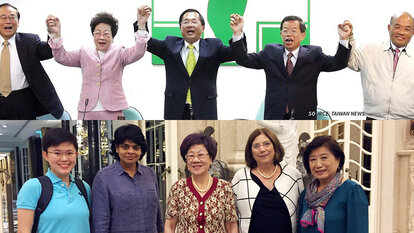
A Taipei Times feature narrated that the novel “is about the contrasting lives of women. One gets married and moves to the US, and to her friends it seems as if she has everything, but she remains dogged by a strong sense of loss. Another character is a univer- sity teacher, who despite being single leads a very colorful life. The third woman is a widow, who reminisces about the good old days with her late husband who she loved dearly -- yet also abhorred. It would later be made into a television program produced by the people behind the phenomenally successful Meteor Garden (Ko, 2006).
In 2000, Chen Shui-bian, Annette Lu and DPP made history when they collectively toppled the more than half a century of KMT’s monopoly of power. They were also the first Taiwan-born president and vice president of their country.
During her term, her primary responsibility was promoting human rights, environmental protection, technology development, and foreign affairs.
As the University of Washington Press stated, “Lu Hsiu-lien’s journey is the story of Taiwan. Through her successive drives for gender equality, human rights, political reform, Taiwan independence, and, currently, environmental protection, Lu has played a key role in Taiwan’s evolution from dictatorship to democracy.”
Indeed, the history of Taiwan and Lu’s life story are intertwined. Needless to say, Lu was shaped by forces very much out of her control. But she did have an impact on how her country would turn out to be. And she had the scars to prove it.
Taiwan is a beacon of democracy enjoying a prosperous economy, a high quality of life and an appreciation of its rich indigenous and Chinese heritage. It has had its more than fair share of turmoil, suffering, foreign occupation and oppression from within, and other hardships.
Her fondness for pearl necklaces has a practical purpose—to cover the scars of her neck. Pearls are formed when irritants like sand enter an oyster and as a defense mechanism, layers of nacre form a thick coat to assuage the effect of the irritant.
As stated earlier, the history of Taiwan and Lu’s life story are intertwined. And they both remind us of how pearls are made.
References
Ko, S.-L. (2006, March 03). Annette Lu’s ‘These Three Women’ set to grace TV screens. Retrieved from Taipei Times: http://www.taipeitimes.com/News/front/archives/2006/03/03/2003295463
Tang, W.-H. A., & Teng, E. J. (2016). Looking again at Taiwan’s Lü Hsiu-lien: A female vice president or a feminist vice president? Women’s Studies International Forum, 92-102.
_______________________
First published on the book, Compelled by Duty, Conscripted by Destiny: Portraits of 16 Asian Women at the Frontline of Democratic Struggle, authored by John Joseph S. Coronel.
In cooperation with the Council of Asian Liberals and Democrats (www.cald.org)